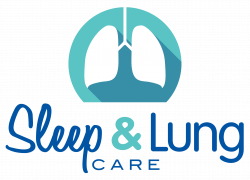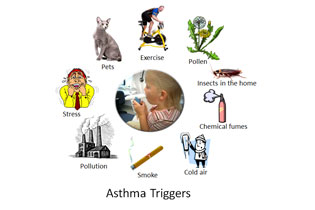Avoiding asthma triggers
What are asthma triggers?
— An asthma trigger is anything that causes asthma symptoms or makes asthma symptoms worse. It’s important to know what your asthma triggers are. That way, you can avoid them so that your symptoms don’t get worse.What are some common asthma triggers?
— Common asthma triggers are:- Cigarette smoke
- Stress
- Getting sick with a cold, the flu, or a lung, ear, or sinus infection
- Strong cleaning products, such as bleach
- Strong perfumes or scents
- Air pollution
- Certain medicines, such as Aspirin and other medicines for pain or fever
- Exercise
- Very cold and dry air
People can have other triggers, too. These include things in the environment that they are allergic to. These are called “allergic triggers.” Examples of allergic triggers are:
- Dust mites – These are tiny bugs that are too small for you to see. They live in beds, couches, carpets, and other places in your home.
- Mold – Mold can grow in basements, showers, and other damp and wet places.
- Dogs and cats – People can be allergic to animal saliva, urine, or dander (flakes of dead skin).
- Pollen from trees, grass, and weeds
- Cockroach droppings
- Mice
How do I know what my asthma triggers are?
— You might already know what makes your asthma symptoms worse. But if you don’t, talk with your doctor or nurse. He or she can help you figure it out by talking with you and asking you questions. Your doctor might do allergy tests to see if you have allergic triggers. Allergy tests include blood tests or skin tests. During a skin test, a doctor puts a drop of a substance that you might be allergic to on your skin, and makes a tiny needle prick in the skin. Then, he or she watches your skin to see if it turns red and bumpy.What should I do when I find out what my triggers are?
— The best thing to do is to stay away from your triggers. For example, if cigarette smoke makes your asthma symptoms worse, avoid people who are smoking. Here are other things that you can do:- To avoid getting sick with an infection, wash your hands often. You can also get a flu shot every year so you don’t get the flu.
- To avoid air pollution, stay indoors when air pollution levels are high, and don’t exercise near a busy road.
- On winter days when the air is cold and dry, cover your mouth and nose with a scarf.
- Avoid using bleach and other strong cleaners.
If you have allergic triggers, try to avoid the things you are allergic to:
- To avoid dust mites, cover your pillows and mattresses with special covers that keep dust mites away, and remove carpets from the bedroom.
- To avoid mold, regularly clean any areas that tend to grow mold, such as sinks and tiles. To keep more mold from growing, use a dehumidifier, fix leaky plumbing, and remove carpets that were damaged by water. You can also remove any indoor plants, as well as other items that might have gotten damp and grown mold, such as old books or bedding.
- To avoid animal saliva, urine, or dander, you can remove the pet from your home and clean your home after the animal has gone.
- To avoid pollen, you can stay inside more during the times of year when your asthma symptoms are worse. Keep windows closed to prevent pollen from getting inside your house. When you do go outside, shower or bathe after you come back in. This can help remove any pollen from your body and clothing.
- To keep cockroaches away, don’t let garbage or dirty dishes pile up. Fix leaky plumbing so there are no puddles of water. If you have cockroaches, use traps to kill them, or call an exterminator.
- To get rid of mice, set traps or call an exterminator.
What if I can’t avoid my triggers?
— If you can’t avoid your triggers, talk with your doctor or nurse about what you can do. Exercise is an example of a trigger that you should not avoid, because exercise keeps you healthy. To prevent asthma symptoms when you exercise:- Take an extra dose of your quick-relief inhaler medicine before you exercise
- Warm up slowly before each exercise session
- Avoid exercising outdoors if it is very cold out

